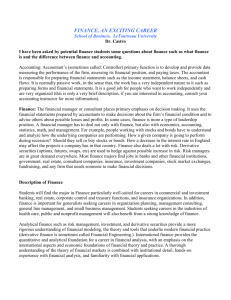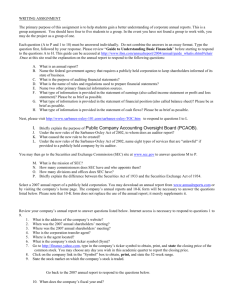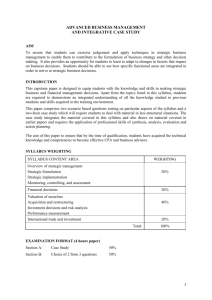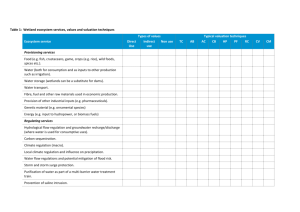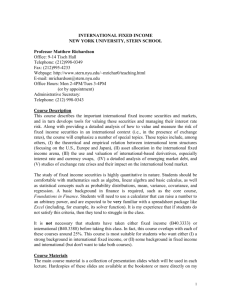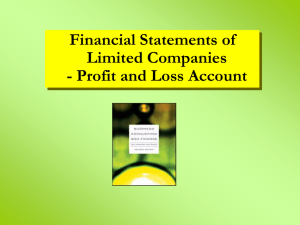SEC Suit Against Directors for Improper Valuation Oversight
advertisement
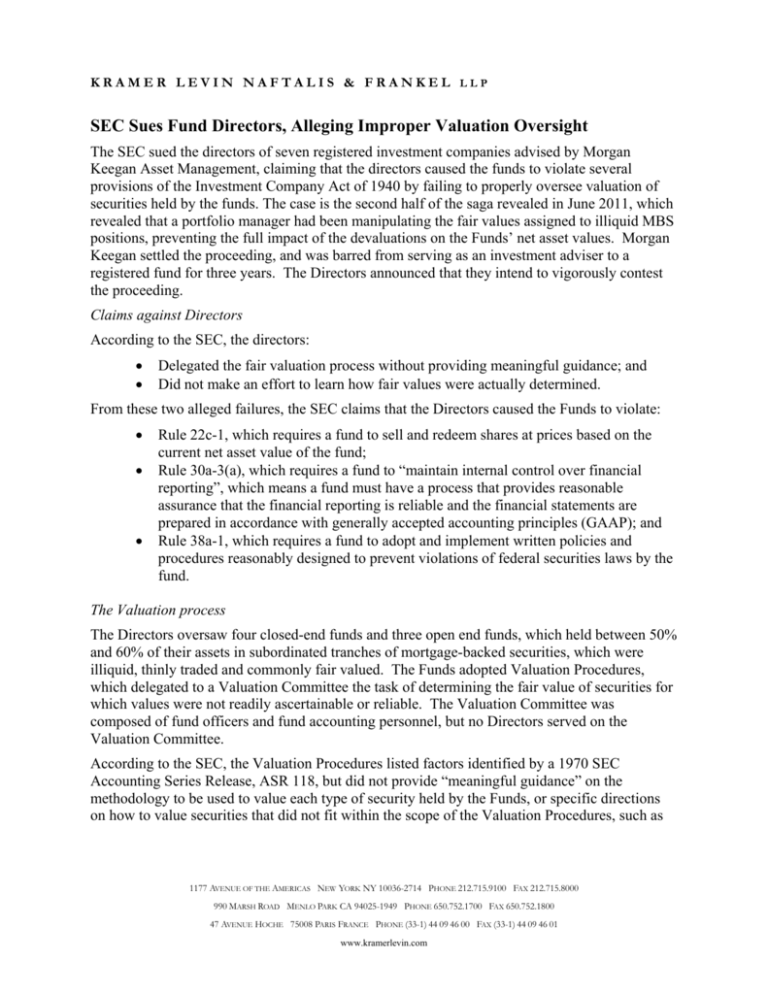
KRAMER LEVIN NAFTALIS & FRANKEL LLP SEC Sues Fund Directors, Alleging Improper Valuation Oversight The SEC sued the directors of seven registered investment companies advised by Morgan Keegan Asset Management, claiming that the directors caused the funds to violate several provisions of the Investment Company Act of 1940 by failing to properly oversee valuation of securities held by the funds. The case is the second half of the saga revealed in June 2011, which revealed that a portfolio manager had been manipulating the fair values assigned to illiquid MBS positions, preventing the full impact of the devaluations on the Funds’ net asset values. Morgan Keegan settled the proceeding, and was barred from serving as an investment adviser to a registered fund for three years. The Directors announced that they intend to vigorously contest the proceeding. Claims against Directors According to the SEC, the directors: Delegated the fair valuation process without providing meaningful guidance; and Did not make an effort to learn how fair values were actually determined. From these two alleged failures, the SEC claims that the Directors caused the Funds to violate: Rule 22c-1, which requires a fund to sell and redeem shares at prices based on the current net asset value of the fund; Rule 30a-3(a), which requires a fund to “maintain internal control over financial reporting”, which means a fund must have a process that provides reasonable assurance that the financial reporting is reliable and the financial statements are prepared in accordance with generally accepted accounting principles (GAAP); and Rule 38a-1, which requires a fund to adopt and implement written policies and procedures reasonably designed to prevent violations of federal securities laws by the fund. The Valuation process The Directors oversaw four closed-end funds and three open end funds, which held between 50% and 60% of their assets in subordinated tranches of mortgage-backed securities, which were illiquid, thinly traded and commonly fair valued. The Funds adopted Valuation Procedures, which delegated to a Valuation Committee the task of determining the fair value of securities for which values were not readily ascertainable or reliable. The Valuation Committee was composed of fund officers and fund accounting personnel, but no Directors served on the Valuation Committee. According to the SEC, the Valuation Procedures listed factors identified by a 1970 SEC Accounting Series Release, ASR 118, but did not provide “meaningful guidance” on the methodology to be used to value each type of security held by the Funds, or specific directions on how to value securities that did not fit within the scope of the Valuation Procedures, such as 1177 AVENUE OF THE AMERICAS NEW YORK NY 10036-2714 PHONE 212.715.9100 FAX 212.715.8000 990 MARSH ROAD MENLO PARK CA 94025-1949 PHONE 650.752.1700 FAX 650.752.1800 47 AVENUE HOCHE 75008 PARIS FRANCE PHONE (33-1) 44 09 46 00 FAX (33-1) 44 09 46 01 www.kramerlevin.com newly developed securities.1 The SEC alleges that the Valuation Procedures were inadequate because they did not: Specify the methodology for valuing particular types of securities; Provide guidance of the relative weight of the fair valuation factors and their interpretation; Specify methodologies or processes to determine methodologies for valuations of securities not otherwise covered; Include how the Valuation Committee should identify or review fair values assigned to securities for which priced remained unchanged; and Provide sufficient reporting to the Board of Directors, which received information on securities fair valued but did not receive other relevant information about the process of fair valuation. Although the Valuation Procedures required a written report of how fair value was determined for each security and showing the accuracy of the fair values as compared to the next reliable price, the SEC believed this report was not sufficient and only covered a portion of the fair valuations during the period. How valuation worked at Morgan Keegan According to the SEC, the Fund Accounting department established the initial fair value for each securities as its purchase price. No change in fair value was considered until there was a 5% variance from this value based on other inputs, which were normally price confirmations from broker-dealers. The price confirmations were not broker quotations, but rather, non-binding opinions on the value of a particular security. The price confirmations received by the Funds were not offers to purchase the security at the particular price. In 2011, when the SEC sued the investment adviser,2 it alleged that Fund Accounting periodically permitted the Funds’ portfolio manager to make changes in the values of securities held in the Funds’ portfolios. According to the SEC’s administrative proceeding in that case, the portfolio manager actively screened and influenced at least one broker-dealer to either change price confirmations provided to the fund accounting group and the funds’ independent auditor, or decline to provide confirmations if the confirmations would be lower than the value at which the security was currently carried on the funds’ books ; failed to notify the fund accounting department or the funds’ boards of information suggesting particular security valuations should be reduced; provided arbitrary “price adjustments” to the fund accounting department without providing a reasonable basis, as required by the procedures; 1 The first mortgage-backed security, issued by Fannie Mae and guaranteed by Ginnie Mae, debuted May 1, 1970, 6 months before the SEC’s ASR 118. ASR 118 does not address pass-through securities directly, but discusses the factors involved in valuing securities. 2 In the matter of Morgan Asset Mgmt. Inc. et al, SEC Admin. File No. 3-13847 (June 22, 2011). Morgan did not admit or deny the SEC’s allegations and paid fines of $200 million. The portfolio manager was barred indefinitely. Morgan Asset Management and its broker-dealer affiliate, Morgan Keegan, agreed to “abstain from involvement” in valuing fair valued securities of registered funds for three years, effectively ending its role as investment adviser and distributor of registered funds. 2 when broker confirmations varied from the funds’ valuation of a security by 5% or more, determined whether security valuations should be adjusted or whether broker price confirmations should be ignored; and softened fund NAV declines by using pre-planned valuation adjustments over a period of days, which lowered a security’s value over time (but still overvalued the security compared to price confirmations received from broker-dealers until all daily declines were implemented). The SEC also alleged that the fund’s accounting agent failed to perform its role under the valuation procedures, because the fund accounting agent: relied with no reasonable basis on the portfolio manager’s price adjustments; permitted lower level and untrained employees to make pricing decisions; and did not re-evaluate fair value prices assigned to securities, allowing them to be carried at stale values for months. According to the SEC in the complaint against the Directors, Fund Accounting randomly checked the valuations of approximately 10% of each Fund’s portfolio by obtaining price confirmations from broker-dealers of end of month pricing. These confirmations were obtained mid-month for the prior month’s last business day. Actual broker-quotes were not obtained to verify valuation. The Valuation Procedures contained provisions addressing price overrides, which were supposed to be reviewed and reported. Fund Accounting interpreted these price override provisions as applying only to broker-quotes and not to price confirmations. Therefore, overrides of price confirmations were not reviewed or reported. Effectively, Fund Accounting periodically permitted the portfolio manager to determine which price confirmations should be ignored and allowed him to set prices for some securities without providing evidence of market inputs and without reporting that the portfolio manager was affecting fair values of the Funds’ securities. According to the SEC, neither the Valuation Committee nor the Board of Directors received adequate information about fair valuation. The Valuation Committee received three primary documents: A security sales report, showing sales of securities that had been fair valued An explanation of fair values for securities that exceeded the 5% variance threshold; and Copies of price confirmations. The Valuation Committee compared the security sales report to the previously assigned fair values. The SEC said they also should have been provided a report on fair values for securities that were not sold or for which confirmations had not been obtained. According to the SEC, the Board did not know or inquire about the methodologies used by the Valuation Committee to fair value particular securities, and did not receive information concerning the basis for fair valuations. The SEC alleges that even after the proceeding against the adviser was commenced, the Board still did not inquire about how fair values were assigned and confirmed. 3 What the Directors saw At Board meetings, Directors received A Valuation Committee Report Fair Value forms for each security fair valued during the quarter, and The Security Sales report (showing sales of securities that had been fair valuaed). The SEC alleges that these documents did not provide sufficient information to the Directors about the valuation process to permit them to oversee Fund valuations. According to the SEC, the Valuation Committee Report was deficient because it did not provide details about how fair value was determined for a particular security and it did not address fair values for positions that were not sold during the period, or price confirmations. According to the SEC, the Directors did not provide guidelines for the use of price confirmations, and did not require any review of securities for which price confirmations were not obtained for any period of time. The SEC alleges that the Fair Value form was deficient because it recited boilerplate explanations for fair valuations: “internal matrix based on actual dealer prices and/or Treasury spread relationships provided by dealers”. The form did not explain the “internal matrix” or indicate what “actual dealer prices” or “Treasury spread relationships” meant, and the SEC alleges that the Directors did not understand how the matrix operated. Although the Valuation Procedures required meaningful “explanatory notes” to be provided to the Directors at least quarterly, the SEC alleges that no such notes were provided an d that the Directors never followed up to request such notes. The SEC also alleges that the internal pricing matrix was only used to price approximately 12% of the holdings of the closed end funds during the period. The SEC alleges that the Security Sales report had little utility to reviewing valuations because it was only provided for securities that had been sold, which amounted to less than 25% of fair valued assets during the time period. In the Matter of J. Kenneth Alderman, et al., SEC Admin. Proc. File No. 3-15127, Investment Company Act Rel. No. 30300 (Dec. 10, 2012). 4 We will continue to keep you informed of new legal and regulatory developments. If you have any questions, please call an attorney in our Financial Services Group. Carl Frischling 212.715.7520 cfrischling@kramerlevin.com Susan J. Penry-Williams 212.715.7510 spenrywilliams@kramerlevin.com Ronald M. Feiman 212.715.9550 rfeiman@kramerlevin.com George M. Silfen 212.715.7522 gsilfen@kramerlevin.com S. Elliott Cohan 212.715.9512 ecohan@kramerlevin.com Aviva Grossman 212.715.7514 agrossman@kramerlevin.com Alexandra K. Alberstadt 212.715.9151 aalberstadt@kramerlevin.com Jacqueline Edwards 212.715.9510 jedwards@kramerlevin.com Mark F. Parise 212.715.9276 mparise@kramerlevin.com Dana DeVivo 212.715.9348 ddevivo@kramerlevin.com Rachael N. De Chacón 212.715.9212 rdechacon@kramerlevin.com Patrick D. Sheridan 212.715.9355 psheridan@kramerlevin.com 5
